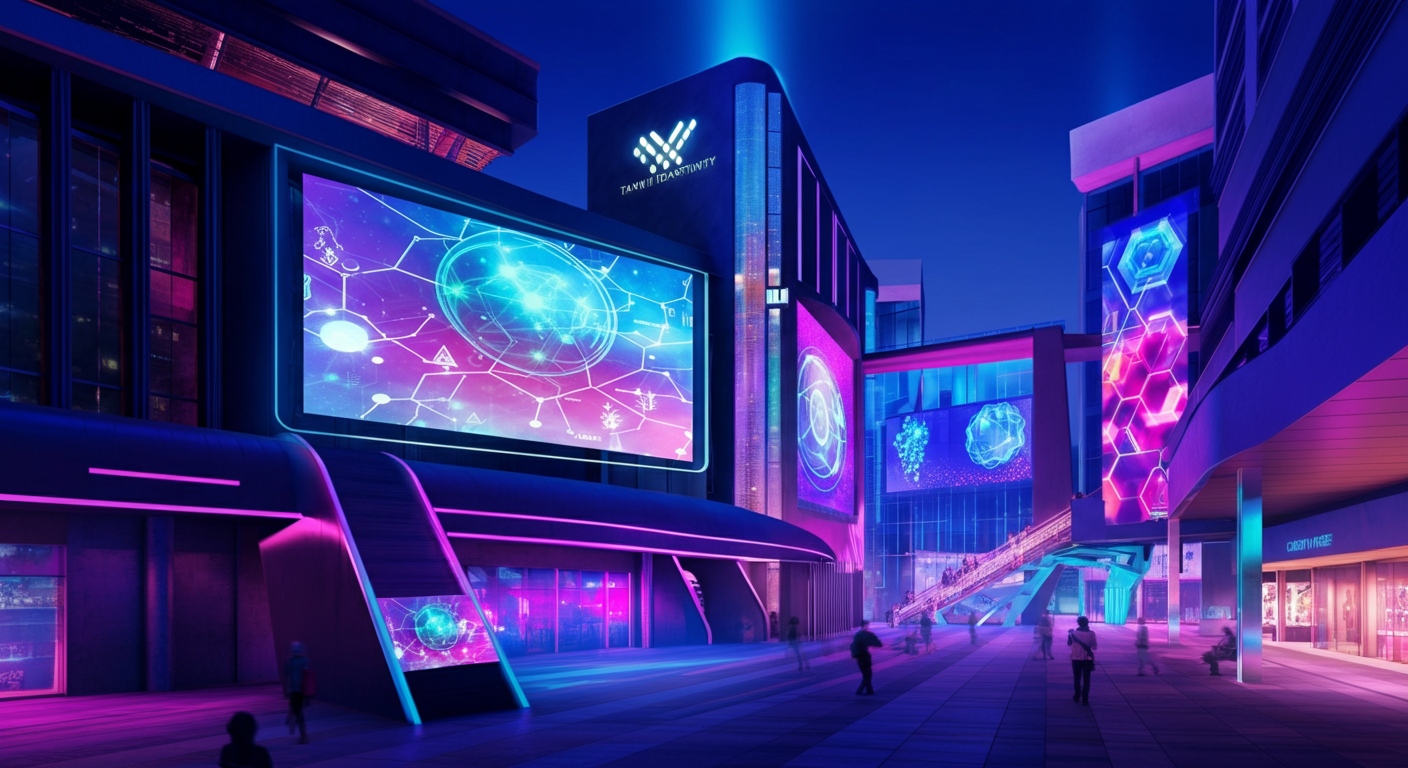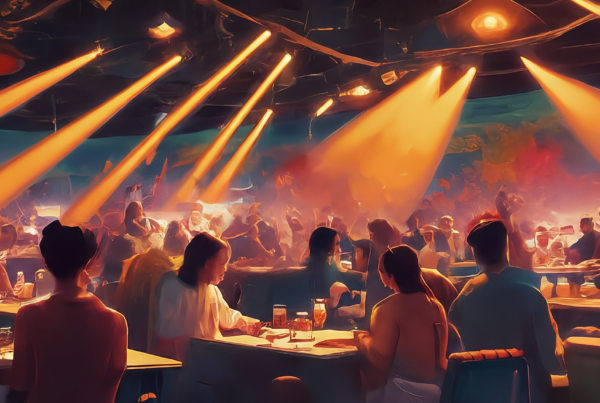In today’s fast-paced world, the commercial entertainment industry is undergoing a significant transformation, driven by technological advancements and changing consumer preferences. From immersive experiences in casinos to interactive displays in restaurants and bars, businesses are constantly seeking innovative ways to captivate their audiences and enhance customer satisfaction. This evolution is not just a trend; it’s a necessity for staying competitive in a market that thrives on delivering memorable experiences.
At the heart of these developments is the concept of Innovations in Commercial Entertainment. This topic is crucial for businesses in the hospitality and entertainment sectors, such as casinos, restaurants, and bars, that aim to create engaging atmospheres and improve customer experiences. With the integration of cutting-edge technologies like augmented reality, virtual reality, and AI-driven content curation, businesses have the opportunity to revolutionize how they entertain and interact with their customers.
As we delve into the future of commercial entertainment, we will explore the latest trends and technologies shaping the industry. From the rise of digital signage solutions to the implementation of smart home entertainment systems, these innovations are paving the way for a new era of customer engagement. DLM Media, with its commitment to delivering high-quality video programming solutions, is at the forefront of these changes, offering businesses the tools they need to succeed in this dynamic landscape.
Join us as we navigate the exciting world of commercial entertainment innovations, uncovering strategies and solutions that can significantly impact your business strategy. Whether you’re looking to enhance your current offerings or explore new avenues for growth, understanding these trends is essential for staying ahead of the curve and creating unforgettable experiences for your customers.
Emerging Technologies Transforming Entertainment
The entertainment industry is undergoing a seismic shift, driven by emerging technologies like virtual reality (VR), augmented reality (AR), and artificial intelligence (AI). These innovations are not only reshaping how businesses operate but also redefining customer expectations and experiences. By offering immersive and interactive experiences, these technologies captivate audiences and enhance engagement, making them essential tools for businesses in the hospitality and entertainment sectors.
As businesses strive to stay competitive, understanding and integrating these technologies can provide a significant edge. Companies like DLM Media are at the forefront, offering solutions that harness these innovations to create unforgettable experiences. Let’s explore how these technologies are transforming the entertainment landscape and the potential challenges businesses might face in their implementation.
Virtual Reality: Immersive Experiences
Virtual reality has revolutionized the entertainment industry by providing immersive experiences that transport audiences to other worlds. From virtual roller coasters to educational simulations, VR offers a diverse range of applications. For instance, Zero Latency, a VR franchise, has successfully integrated VR experiences in over 25 countries, allowing guests to engage in activities like zombie fighting and puzzle-solving. Their success demonstrates the growing demand for VR-based entertainment.
However, implementing VR comes with challenges, such as the need for significant investment in equipment and training. Businesses must also consider space constraints and the need for regular updates to keep the content fresh and engaging. Despite these challenges, the potential for creating unique and memorable experiences makes VR a worthwhile investment for many entertainment venues.
Augmented Reality: Enhancing Real-World Interactions
Augmented reality adds a digital layer to the real world, creating engaging and interactive experiences. For example, Legoland Windsor uses AR to bring static models to life, enhancing the visitor experience. This technology is particularly effective in venues like museums and theme parks, where it can transform traditional exhibits into interactive adventures.
To successfully implement AR, businesses must invest in the right software and hardware, such as AR glasses or mobile apps. It’s also crucial to provide clear instructions for users, as tech literacy varies among audiences. With the right approach, AR can significantly enhance customer engagement and satisfaction.
Artificial Intelligence: Personalization and Efficiency
Artificial intelligence is transforming the entertainment industry by enabling personalized experiences and improving operational efficiency. AI can analyze customer preferences and behavior to offer tailored recommendations, enhancing the overall experience. For instance, AI-driven platforms can curate personalized music playlists or suggest relevant content based on viewer history.
While AI offers numerous benefits, businesses must address potential challenges, such as data privacy concerns and the need for robust data management systems. By ensuring transparency and security, companies can leverage AI to create more engaging and personalized entertainment experiences.
In conclusion, the integration of VR, AR, and AI into the entertainment industry is reshaping how businesses interact with their audiences. By embracing these technologies, companies can create immersive and engaging experiences that captivate customers and drive success. For more insights on how to leverage these innovations, explore additional resources on DLM Media’s website.
Innovative Business Models in Entertainment
The entertainment industry is witnessing a dynamic transformation, driven by innovative business models that are reshaping how content is delivered and consumed. At the forefront of these changes are subscription services and digital distribution, which have revolutionized traditional entertainment paradigms. As businesses strive to stay competitive, understanding these new models is crucial for success.
Subscription services, such as Netflix and Spotify, have disrupted traditional entertainment by offering consumers unlimited access to content for a fixed monthly fee. This model not only provides convenience but also fosters a personalized user experience. Meanwhile, digital distribution has enabled creators to reach global audiences without the need for physical media, reducing costs and increasing accessibility. These innovations are setting new standards in the industry, compelling traditional players to adapt or risk obsolescence.
The Rise of Streaming Services
Streaming services have become a cornerstone of modern entertainment, providing on-demand access to a vast array of content. Unlike traditional cable, streaming platforms offer personalized recommendations, allowing users to discover new shows and movies tailored to their preferences. This shift has been fueled by advancements in internet technology and consumer demand for flexibility and choice.
For instance, platforms like Hulu and Amazon Prime Video have capitalized on this trend by producing exclusive content, further enticing subscribers. According to a report by Deloitte, streaming subscriptions have surpassed traditional pay-TV in many households, highlighting the growing preference for digital consumption. As a result, businesses must consider integrating streaming options to remain relevant in this evolving landscape.
Impact on Traditional Models
The advent of streaming services has significantly impacted traditional entertainment models, such as cable TV and movie theaters. With the convenience of accessing content anytime, anywhere, consumers are increasingly cutting the cord. This trend has led to a decline in cable subscriptions, prompting providers to explore new revenue streams.
Similarly, the film industry has had to adapt by embracing digital releases alongside theatrical premieres. The COVID-19 pandemic accelerated this shift, with studios opting for simultaneous streaming and cinema releases to reach wider audiences. This hybrid approach not only maximizes viewership but also caters to diverse consumer preferences.
Comparing Old and New Business Models
To understand the impact of these innovations, it’s essential to compare traditional and modern business models. Previously, entertainment relied heavily on physical sales and advertising revenue. However, the rise of digital platforms has shifted the focus to subscription-based and ad-supported models.
For example, traditional cable relied on bundled packages, often forcing consumers to pay for channels they didn’t watch. In contrast, streaming services offer customizable plans, allowing users to select content that suits their interests. This flexibility has been a significant factor in the success of digital platforms, as evidenced by the rapid growth of services like Disney+.
In conclusion, the entertainment industry is undergoing a profound transformation, driven by innovative business models that prioritize consumer choice and convenience. As these trends continue to evolve, businesses must adapt to meet changing demands and leverage new opportunities for growth. For more insights into the future of entertainment, explore additional resources on DLM Media’s website.
Enhancing Customer Experience Through Innovation
In the ever-evolving landscape of commercial entertainment, enhancing customer experience has become a pivotal focus for businesses. The integration of Innovations in Commercial Entertainment is transforming how companies engage with their audiences, offering personalized and interactive experiences that resonate with modern consumers. As businesses strive to differentiate themselves, understanding the role of personalization and interactivity is crucial.
Personalization is at the forefront of these innovations, allowing businesses to tailor experiences to individual preferences. By leveraging data analytics and artificial intelligence, companies can offer customized content and recommendations, creating a more engaging and satisfying customer journey. For instance, AI-driven platforms can analyze user behavior to suggest personalized playlists or targeted promotions, enhancing customer loyalty and satisfaction.
Personalized Customer Experiences
Personalization in entertainment is not just a trend; it’s a necessity for businesses aiming to captivate their audiences. Companies like Netflix and Spotify have set the standard by offering tailored content recommendations based on user preferences and viewing history. This approach not only enhances user satisfaction but also increases engagement and retention.
Moreover, businesses in the hospitality sector are adopting similar strategies. For example, casinos and restaurants are using customer data to offer personalized promotions and experiences. By understanding customer preferences, these businesses can create unique offerings that cater to individual tastes, driving repeat visits and fostering loyalty.
Interactivity and Engagement
Interactivity is another key component in enhancing customer experiences. Innovations such as virtual reality (VR) and augmented reality (AR) are revolutionizing how businesses engage with their audiences. These technologies offer immersive experiences that transport users to different worlds, providing a level of engagement that traditional entertainment cannot match.
For instance, VR-based attractions in theme parks and museums allow visitors to interact with exhibits in new and exciting ways. Similarly, AR applications in retail and dining venues can enhance the customer experience by overlaying digital content onto the physical environment, creating a more engaging and interactive atmosphere.
Testimonials: Real-World Impact
Testimonials from businesses that have embraced these innovations highlight the tangible benefits of enhancing customer experiences through personalization and interactivity. A restaurant chain that implemented personalized dining experiences reported a significant increase in customer satisfaction and repeat visits. Similarly, a casino that introduced interactive gaming experiences saw a notable boost in customer engagement and revenue.
These success stories underscore the importance of adopting Innovations in Commercial Entertainment to stay competitive in a rapidly changing market. By focusing on personalization and interactivity, businesses can create memorable experiences that resonate with their audiences and drive long-term success.
For more insights on how to leverage these innovations, explore additional resources on DLM Media’s website.
Embracing the Future of Entertainment
As we navigate the dynamic landscape of commercial entertainment, it’s clear that embracing technological advancements is no longer optional but essential for success. Businesses in the hospitality and entertainment sectors must adapt to the evolving demands of consumers who seek immersive and personalized experiences. The integration of technologies like virtual reality, augmented reality, and artificial intelligence offers unprecedented opportunities to captivate audiences and enhance engagement.
Key innovations in commercial entertainment are reshaping business strategies and creating new revenue streams. For instance, the rise of streaming services and digital distribution has disrupted traditional models, compelling companies to rethink how they deliver content. Similarly, the adoption of personalized and interactive experiences is transforming customer interactions, fostering loyalty, and driving repeat visits.
Key Takeaways
- Virtual Reality (VR): Offers immersive experiences that transport audiences to different worlds, enhancing engagement and satisfaction.
- Augmented Reality (AR): Adds digital layers to real-world interactions, creating interactive and engaging environments.
- Artificial Intelligence (AI): Enables personalized content curation and operational efficiency, enhancing customer experiences.
- Digital Distribution: Revolutionizes content delivery, offering convenience and accessibility to global audiences.
Businesses must not only adopt these innovations but also stay informed about emerging trends to remain competitive. By leveraging these technologies, companies can create unforgettable experiences that resonate with modern consumers and drive long-term success. We encourage you to explore further innovations in commercial entertainment by visiting DLM Media’s website, where you’ll find resources and solutions tailored to your business needs. Embrace the future of entertainment and unlock new opportunities for growth and customer engagement.





